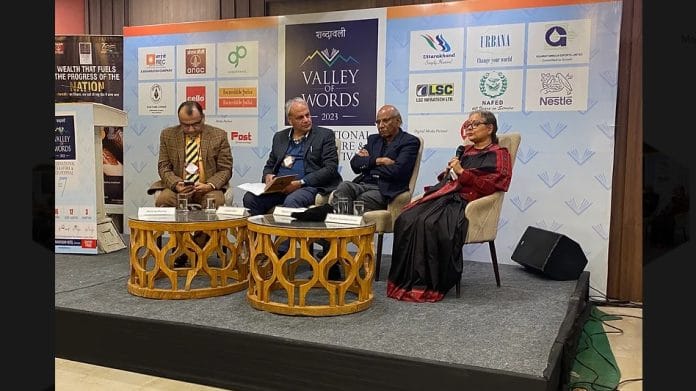New Delhi: Eight books won awards in the literature and arts festival Valley of Words, which was held in Dehradun on 16-17 December.
In the sessions that followed, authors and translators reflected on the significance and timelessness of their stories.
Writer Usha Kiran Khan’s Dinank Ke Bina stressed on the importance of rooted language, while she spoke in a session about her own journey in a male-dominated society.
Sheher se Dus Kilometer by Neelesh Raghuvanshi tackles the enduring plight of farmers, echoing Munshi Premchand’s timeless concerns while simplifying the Bundelkhandi language to foster interest among new readers.
Amrita Bera, who translated author Manoranjan Byapari’s Bhaaga Hua Ladka from Bangla to Hindi, discussed the intricacies of this autobiography of a Dalit boy escaping East Pakistan.
The Journey of Hindi Language Journalism in India saw Mrinal Pande commenting that Hindi has become hollow without its local quirks.
Author of No Way In Udayan Mukherjee pointed out that platitudes about being pained by the miserable lives of our domestic workers rarely result in concrete solutions, such that minorities continue to face structural issues.
Children of the Hidden Land author Mandira Shah reflected on how location shaped character, tackling the subject through the perspective of her children who are growing up in the tumult of Manipur.
The other books were Kanyadaan: The Bride, translated from Maithil to English by Lalit Kumar, and Jhupli’s Honey Box, by Achintyarup Ray.
Uttarakhand was also in focus in this volunteer-driven, non-profit festival, with a talk by legendary environmentalist Chandi Prasad Bhatt on the need to safeguard the Himalayas and its glaciers from hazardous elements.
The exhibitions at the Festival were in tune with this sentiment, featuring a range of stalls with Himalayan handicrafts created by local artisans.
Organic foods like millet pancakes were also on display, urging festival-goers to consume sustainable, locally-grown produce in which profits return to their rural makers.
The sustainable fashion at the Iti Smriti stall, hosted by VoW, was a huge hit with attendees and many could be spotted wearing the signature cloth-and-silver earrings as they went around the sessions and exhibitions.
A roundtable moderated by Amna Mirza on the National Education Policy (NEP) saw administrators of Uttarakhand universities weigh in on the new policy.
The series on the Legends of Doon brought forth heartfelt tributes for Raj Kanwar, Pradeep Singh, and S.K. Das. Friends and family shared memories, and the legacies of these men who have impacted Dehradun.
There were several book launches, like Sylhet to Shillong: The Story of the Last IGP of Undivided Assam by Bijoya Sawian and Wanderings in the Land of Mist by Anmol Jain.
Beyond the written word, there was also music — performances by the ITC SRA: Swarnendu Mondal on the sarod and Ashis Paul on the tabla wove magic for the audience.
Dance too was a prominent aspect of the festival through the Iti Nritya showcase curated by Shalini Rao, which saw the finalists of a national dance competition bring their craft to Dehradun.
Governor of Uttarakhand Lt. Gen Gurmit Singh presided over the launch of the magazines Shabdavali Smarika and the annual VoW edition of The Book Review.






